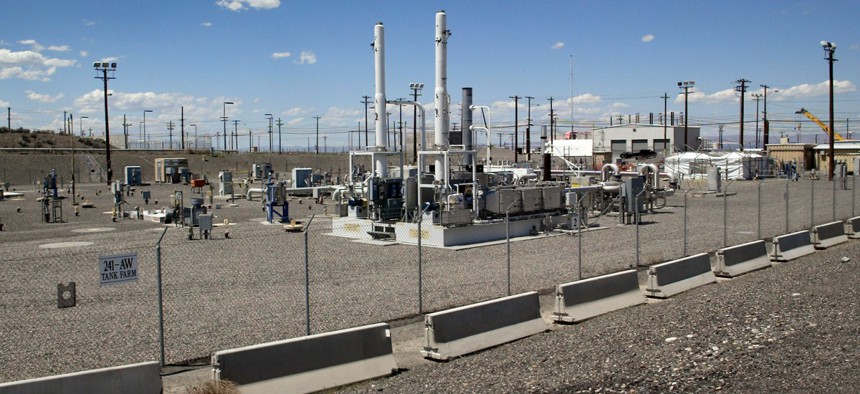Court fight over $45B Hanford tank contract resumes

One of the underground tank farms is seen on the Hanford Nuclear Reservation in June 2005 near Richland, Washington. Photo by Jeff T. Green / Getty Images
The Energy Department's decision to stick with its preferred bidder for the contract to manage a vast farm of radioactive waste storage tanks is again the subject of a lawsuit.
The legal fight over a 10-year, $45 billion contract to manage a vast network of underground liquid waste tanks at the Hanford site in Washington state is resuming for a second time.
In a new federal lawsuit filed March 26, the Hanford Tank Disposition Alliance claims that the Energy Department unfairly and incorrectly changed the solicitation so it could again choose the rival JV bidder for the contract.
Hanford Tank Waste Operations & Closure was re-awarded the 10-year contract in late February, less than one year after Energy first selected the H2C JV.
BWXT Technologies is the leader of H2C alongside partners Amentum and Fluor Corp, while the HTDA venture is led by Atkins alongside partners Jacobs and Westinghouse. Amentum is undertaking a merger with Jacobs' government technology and services businesses, one of which is involved in HTDA.
The contract in dispute covers the management of underground tank farms holding approximately 56 million gallons of radioactive waste, which will go into a vitrification plant for treatment. The winner of the contract will operate that Bechtel-built plant as well.
Hanford is a decommissioned nuclear site that once was home to plutonium production between 1943 and 1987.
In June 2023, Federal Claims Court Judge Marian Blank Horn invalidated the original award after finding that H2C was not properly registered in the government's System of Award Management that houses information on contractors.
H2C was found to have submitted its proposal after having let its SAM registration expire for five months.
Energy subsequently took in revised proposals and allegedly removed two requirements in the solicitation that said bidders must be registered when submitting their bids and the registration should continue through the time of award, HTDA's now-unsealed complaint says.
HDTA has told the court that Energy should have started out by first publishing that change in the Federal Register, then moved to collect comments as part of the rulemaking process that governs contracting.
HDTA says all of that should have taken place before being applied to any one contract, plus that it raised this argument in an agency-level protest on Oct. 10.
Much of the lawsuit is redacted, including details that would have given a comparison as to how Energy viewed the rivaling proposals. But HDTA does claim Energy conducted a flawed best-value tradeoff in the evaluation.


